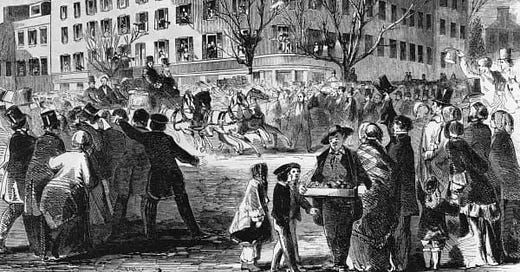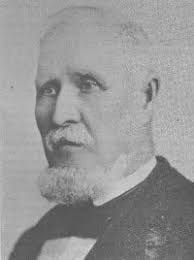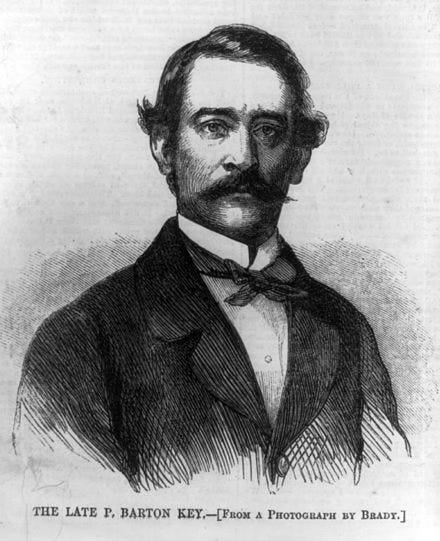Some believe there may be an unequal justice system in America when it comes to holding Washington, DC officials accountable. If so, it began at least two centuries ago.
In the spring of 1856, in the nation’s capital, Democratic Congressman Philemon Herbert of California fatally shot Thomas Keating, a waiter working in the Willard Hotel dining room. Herbert was twice tried and was eventually acquitted of murder.
The following is derived from witness testimony from the preliminary hearing before a pair of magistrates, held on May 8–9, 1856, as published in the New York Daily Times. The article appeared in the May 12th edition of the paper.
According to eyewitness accounts, Herbert and a friend, William A. Gardiner, arrived in the Willard Hotel dining room after 11 a.m. and ordered breakfast. Waiter Jerry Riordan greeted the pair and returned with a partial breakfast order. The congressman was furious he did not receive his complete meal and demanded the rest of his breakfast. Riordan told the pair that because breakfast service ended a short time earlier that he was only able to deliver what was available in the kitchen. The waiter informed the pair he would need to get permission from the office before another breakfast meal could be prepared and served.
This answer did not sit well with the California congressman. Herbert was not interested in waiting for a decision from the office. Instead, he ordered another waiter, Thomas Keating, to “get my breakfast, damned quick.” He then called Keating “a damned Irish son of a bitch.”
Keating’s reply to Herbert was not clearly heard by the eyewitnesses. But whatever the response, it apparently set off Herbert. Herbert erupted in rage and leaped from his chair. He drew his pistol and struck Keating on the back of his neck with it.
Keating grabbed a plate from a nearby table and prepared to throw it at Herbert but apparently thought better of it. That brief pause in fighting did not stop Herbert. He threw a chair at Keating who then threw the plate at Herbert. The two men began to scuffle. Herbert’s dining companion, Gardiner, leapt to his friend’s defense. Gardiner grabbed a chair and broke it on Keating.
The dining room steward, who was brother of the waiter, Patrick Keating, emerged from the kitchen and joined the melee. Gardiner struck Patrick Keating with another chair.
Patrick Keating grabbed the barrel of Herbert’s gun, which the congressman had been waving about. The cook, a Frenchman named J. E. Devenois, emerged from the kitchen and attempted to break up the brawl. Patrick Keating lost his grip of Herbert’s gun. With the gun now free, Herbert grabbed the collar of Thomas Keating with one hand and shot him. Thomas Keating collapsed to the floor, dead. The fighting came to an end.
There were competing accounts on which party initiated the scuffle, which the New York Daily Times called “a thrill of horror in the community.” Prosecution witnesses portrayed Herbert and Gardiner as the aggressors. Defense witnesses claimed Herbert was merely defending himself against several aggressive members of the dining room staff.
The Dutch ambassador, Mr. Henry DuBois, was in the dining room and witnessed the events. As a diplomat, he was considered to be the most reliable and impartial witness. However, he resisted being dragged into the scandal. He refused to be called as a witness, which proved damaging to the prosecution.[1]
Some members of Congress wanted to have Herbert expelled from the chamber over the fatal shooting. However, they did not have enough votes to remove him. House Democrats viewed Herbert as a firm supporter of slavery and they believed they would need his vote in the months ahead. There was a growing anti-slavery movement in the nation and every vote was needed to preserve the status quo.
After the two-day preliminary hearing, magistrates ruled there was ample evidence that a crime had been committed and referred the matter to the US District Court for the District of Columbia.
The prosecutor was the US attorney for the District of Columbia, Philip Barton Key II. He was the son of Francis Scott Key, who wrote the Star-Spangled Banner. He was a playboy who was later killed by another sitting congressman in a fit of rage for having an affair with that congressman’s wife. He was also a friend of Philemon Herbert.
Herbert was acquitted of manslaughter charges after two trials. Both the judge and the prosecutor were viewed as sympathetic to Herbert and may have influenced the jury’s not guilty decision. It was also widely thought no jury in Washington, DC would actually convict a sitting member of Congress for killing an Irishman.
Herbert declined to run for reelection later that year. In 1864, he died from wounds suffered during a Civil War battle. He was serving as an officer in the Confederate Army.
Mark Hyman is an Emmy award-winning investigative journalist. Follow him on Twitter, Gettr, Parler, Post, and Mastodon.world at @markhyman, and on Truth Social at @markhyman81.
His books Washington Babylon: From George Washington to Donald Trump, Scandals That Rocked the Nation and Pardongate: How Bill and Hillary Clinton and their Brothers Profited from Pardons are on sale now (here and here).
[1] Thomas Keneally, American Scoundrel: The Life of the Notorious Civil War General Dan Sickles, (New York: Doubleday, 2002), 67.






